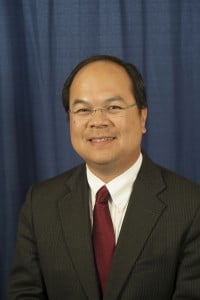
I was born during my father’s pediatric endocrinology fellowship at Charity Hospital in New Orleans. However, as a child I had no idea about the field of endocrinology. My father’s textbooks in his study on disorders of metabolism and growth were very foreign to me.
I didn’t get a true appreciation for endocrinology until my elective rotation in endocrinology as a fourth-year medical student at Tufts University School of Medicine in Boston. I spent four weeks serving as an apprentice under Burritt Haag, MD, at Baystate Medical Center in Springfield, Mass. I was surprised to see that the rare conditions that we studied as a first- and second-year medical student actually existed. I was fascinated with the diagnostic testing for these endocrinology conditions and loved to solve these interesting mysteries.
I entered residency at Boston University with the idea that I was going to be an endocrinologist. Fortunately for me, as an intern I could practice endocrinology every day on the wards. I would make daily insulin adjustments for my ward patients much to the chagrin of my senior residents. I would perform dynamic endocrine testing on patients that I suspected had endocrine disease. I filled my continuity clinic during residency with very interesting endocrine patients that I had cared for during their inpatient hospitalizations which ranged from the simple endocrine disease like Hashimoto’s thyroiditis to the more complex adrenal disorders.
“I was surprised to see that the rare conditions that we studied as a first- and second-year medical student actually existed. I was fascinated with the diagnostic testing for these endocrinology conditions and loved to solve these interesting mysteries.”
My experiences during residency further solidified my desire to become an endocrinologist. However, I craved an opportunity to learn more about endocrinology research. During my second year of residency, I cashed in all of my elective time for a chance to work on basic vitamin D research in the laboratory of Michael Holick, PhD, MD. I was intrigued how vitamin D was actually a hormone and could have so many actions on human cells. My positive clinical and research experiences during medical school and residency further solidified my desire to pursue endocrinology.
During my fellowship, I had the opportunity to further develop as clinical/translational physician-scientist in the field of endocrinology. My mentor, Dr. Holick, impressed upon me that you can care for more patients when you make important scientific discoveries. My scientific training after fellowship cumulated in a PhD degree in Molecular Medicine studying the mechanisms by which the vitamin D hormone decreases colon cancer proliferation in vitro and in vivo. I was also involved in several clinical studies describing the prevalence of vitamin D deficiency in the young and healthy ambulatory population.
I attended my first Endocrine Society Annual Conference in 2001 and presented my findings of a high prevalence of vitamin D deficiency in healthy individuals which led to one of my first manuscripts. In my early career, I had several opportunities to present my research at the ENDO. These meetings were an important part of my training as a trainee and early career faculty member.
I have been fortunate to have many other mentors and role models that shaped me as an endocrinologist today including my father, Vithavas Tangpricha, MD, Stuart Chipkin, MD, Tai Chen, MD, and Joshua Safer, MD. Finally, my endocrinology chief during fellowship, Lewis Braverman, MD, further cultivated and supported my early endocrinology training to ensure that my dream of being an academic endocrinologist was fulfilled.
Vin Tangpricha, MD, PhD,
Associate Professor of Medicine, Division of Endocrinology, Metabolism and Lipids, Emory University School of Medicine, Atlanta, Ga.

